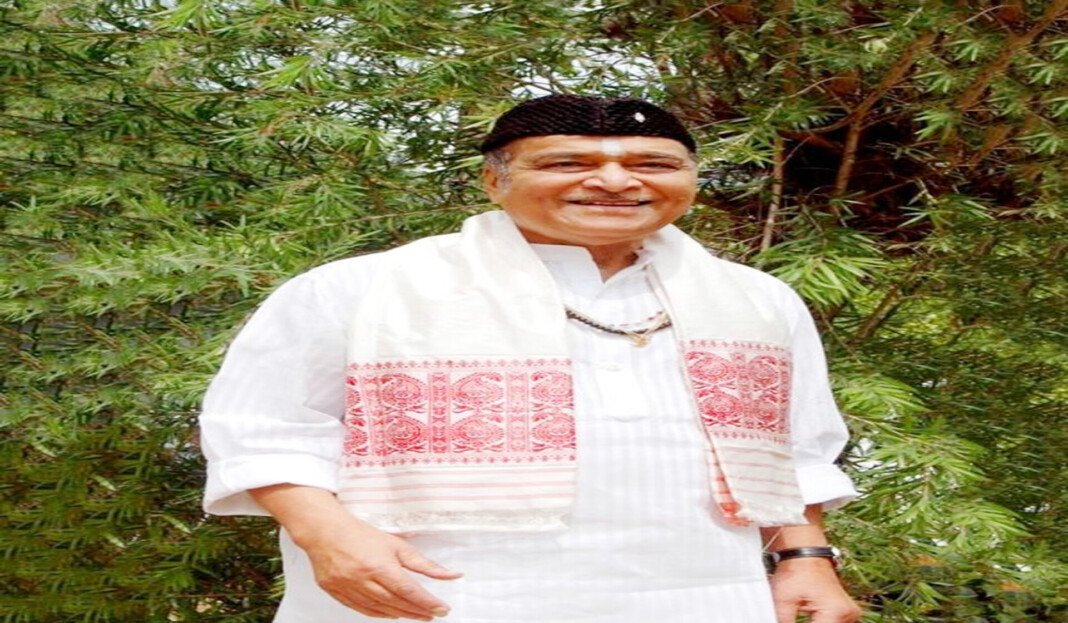By: Dipak Kurmi
The essence of humanism lies in the general love of humanity. The philosophical and ethical perspective of humanism places a profound emphasis on the value and agency of human beings. The dignity of man is acknowledged, and humanism asserts the centrality of the human being. Its overarching goal is to enhance the aims, values, and goals of individuals, aiming for an intimate harmony between the life of an individual and society. Central to humanism is the supremacy of man and the promotion of the welfare of mankind. This philosophy of compassion is exclusively dedicated to addressing human needs and solving human problems, both at the individual and societal levels.
Dr Bhupen Hazarika, the magnificent personality known as Asom Ratna (Jewel of Assam), indeed possesses a cosmopolitan outlook. Bringing Assamese culture to the international podium, he has become a global ambassador for the rich heritage of Assam. The legendary singer, Dr Bhupen Hazarika, has made Assam and its culture known worldwide through his impactful songs. A polymath, he is a complete man, excelling as a lyricist, poet, composer, singer, director, actor, litterateur, journalist, editor, and social worker. Dr Bhupen Hazarika, the greatest cultural icon of Assam, recognizes the innate social nature of humans and the significance of relationships. As a sincere and unique humanist, he has left an indelible mark on the cultural landscape.
“Humanism” is a broad term that denotes a perspective centered on humankind. It doesn’t adhere to a specific school of thought or philosophical doctrine; instead, it represents a dimension of thought. The term “humanism” has associations with words like humus (ground, earth), humanus (human, earthy), and homo (earth being). However, the widely accepted view is that ‘humanism’ originates from the Latin word “humanus,” signifying “human being.” In essence, humanism encompasses a system of thought that revolves around human affairs in general. Examining its historical roots, humanistic thought traces back to ancient Greece, where the Sophists and Epicureans were likely among the earliest humanists in history. Throughout the Classical, Renaissance, and Enlightenment periods, humanism has evolved and manifested in various dimensions.
Humanistic elements were deeply ingrained in ancient Indian thought. The core of Indian humanism lies in the principle of “Ayam Atma Brahma” (I am Brahman or ātman and Brahman are the same). The Upanishads, central to this philosophy, aimed to elevate human life from mere biological existence to the status of a self-conscious spiritual being. The Bhagavad Gitā, with its concept of the union of the empirical self with the Divine self or Brahman, established the norm of Indian humanism. The Cārvākas, a group of thinkers, were exclusively concerned with the present life of man, rejecting the existence of God, Soul, and an afterlife. In this context, they too can be considered humanists. Jainas placed unwavering faith in man and his capabilities, asserting that without supernatural assistance, individuals can pave their way to ultimate bliss. On the other hand, Buddha’s sole focus was on man and his sufferings, making Buddhism a significant form of humanism that believed in the individual’s capacity to realize human values.
The term “humanism” made its debut in the early nineteenth century when Friedrich Immanuel Niethammer, the Central Commissioner of Education in Bavaria, Germany, introduced the term Humanismus in 1808. He used it to characterize the new classical curriculum he intended to implement in German secondary schools. By 1836, the term had found its way into the English language, and by 1856, it had gained universal acceptance. In the modern age, the spirit of humanism has gradually awakened in a more explicit and comprehensive manner. The European Renaissance, in particular, acknowledged human reason, passion, and values while emphasizing the intrinsic worth of human life and the vast potentialities it holds. Over time, humanistic thinking took on various forms such as Marxism, Existentialism, Pragmatism, and more. Today, the term “humanism” is associated with diverse designations like scientific, political, naturalistic, romantic, liberal, secular, religious, and beyond.
Dr. Bhupen Hazarika, the artist of multi-faceted talents, stands as an epoch-making singer whose songs vividly paint pictures of love, nature, humanity, country, and nation. His exceptional combination of words, melody, and voice has set him apart, making him an artist from the very essence of the soil to the depth of the soul. Bhupen Hazarika, sincere in his convictions, used his songs as a powerful instrument for social change. Recognized as the rhymester of the mighty Brahmaputra, he penned his first song in 1937 at the tender age of eleven, paying tribute to the invaluable contributions of Sri Sankaradeva. In his second song, “Agni Jugar Firingati Moi” – Of the fiery age; I’m a spark (1939), he candidly expressed the spirit of a social reformist. Functioning as a mass communicator, Bhupen Hazarika’s songs became the “weapon of the weak.” His dream extended to building a modern Assam where all communities, including Harijan, Pahari, Hindus, Muslims, Bodos, Koch, Kachari, Chutiya Ahom, and others, enjoy equal status.
Dr. Hazarika, in a good number of his songs, places the “man-in-society” as the primary subject, projecting the individual as the focal point of societal dynamics. He discerns inhumanities, injustice, oppression, and exploitation as significant social evils. Through his songs, Bhupen Hazarika articulates the essence of social change, striving to secure rights, freedom, and justice for the poor and exploited working people. Firmly standing against casteism and untouchability, he advocates for the eradication of feudal exploitation within society. He sings-
“Narakangkalar Astra Xaji loi/Shosankarik badhim/Xarbaharar Xarbasva punara firai anim…”
Bhupen Hazarika, with an honest desire to guide society towards love and brotherhood, consistently aligns himself with the exploited and oppressed. In his songs, he advocates for secular humanism, aiming to broaden personal love into a love for humanity. The evergreen song “Mānuhe Mānuhar Bābe” (If humans do not care) carries his urging plea for people to extend their helping hands to the weaker sections of society…
“Durbal Manuhe Jodi/Jiwanar Kobal Nadi/Par Hoi Tomare Xahot/Tumi Heruwabano Ki…”
Manuhe Manuhar babe has evolved into an anthem of humanity, its lyrics contemplating the essential need for fellow-feeling and bonding among humankind. Another powerful song, “Agni Jugar Firingati Moi,” not only reflects the sense of humanism but also echoes Bhupen Hazarika’s deep patriotism and love for the Indian Nation. His affiliation with the “Bhāratiya Gana Nātya Xangha” (Indian People Theatre Association) brought him close to the common people, enriching him with a new spirit of social work dedicated to justice and equality-
“Mukti kami lakksh janor/Mouna Prakash Shunisane Nai…”
Bhupen Hazarika’s social consciousness and responsibility can be deemed innate, as he dedicated himself to reshaping society. Intensely inspired by Paul Robson’s assertion that music is a weapon for social change, Bhupen Hazarika echoed the sentiment, stating, “If I can do something for society through music, I will hold this life of mine to be successful.” Infused with a secular democratic spirit, he embodies a comprehensive humanism in his love for human society. His sincere hope is to continually contribute to positive societal transformation-
“Mor Gan Houk Bahu Asthahinatar Bipartite/Ek Gabhir Asthar Gan/Mor Gan Houk, Kalpana-Bilaxar Bipartite/Ek Xatya Praxhastir Dhyan…”
Sankar-Madhav, Jyoti-Bishnu, laid the foundation of Assamese society and culture, and Bhupen Hazarika, through his songs, undertook the task of reconstruction. With a vision to eradicate evil and corruption in society, he positioned his songs as a powerful force to protest against injustice. This endeavor brought him in close proximity to the common people of society.
Bhupen Hazarika’s humanism is spontaneous, where the language of joy and sorrow is the same for all in his perspective. The essence of humanism and universal brotherhood elevates his songs to a momentous height, marked by humanity, universal fraternity, and emotional bonding. Love, humanism, nature and its beauty, patriotism, social reform, and concern for native land and people are the prominent themes depicted in Bhupen Hazarika’s songs. The humanistic elements and dimensions inherent in his music contribute to its universal acceptance. His classic lyric “Moi Eti Jājābar” (I am a wanderer) best expresses his universal thoughts-
“moi luitor pora mississippi hoi/volgar rup salu/ottawar pora austria hoi/peris haboti lolu/moi illorar pora puroni rohon/chicagole koriyalu/moi Galibor sher dushanber/minarot huna palu/Mark Twainor homadhit bohi/Gorkyr kotha kolu/bare bare dekhu bator manuhu/apun hoise bor/heiye moi jajabor/heiye moi jajabor…”
The doctrine of universalism is best expressed in another song-
“Ami ekekhon naore yatri/Xahayatri ekekhon naore yatri…”
Indeed, we sail in the same boat, brother. Bhupen Hazarika identified himself with the common masses and their struggles. Celebrating the strength of the working class, he saw himself as a co-passenger on the journey toward the same destination. And in his songs, he sings of this shared experience-
“Prothom nohoi/Dwitiyo nohoi/Tritiyo shrenir yatri ami/Jiwan relor dabat ami/Prothom nohoi
Dwitiyo nohoi/Tritiyo shrenir yatri ami…”
Bhupen Hazarika, a people’s artist, expresses profound concern for the downtrodden and underprivileged sections of society through his lyrics. The song “Dolā Ho Dolā He Dolā” delivers a powerful blow to the feudal superstructure. Similarly, in “Rāij āji bhāwariyā deshei nāṭghar” (The people are the players today), he passionately asserts his love and concern for the people. Bhupen Hazarika, the Janatār Shilpi (artist of the masses), emphasizes, “Moromor bhāshār ākhar nāikiā” (language of love doesn’t have an alphabet). Many of his songs speak eloquently about the brotherhood of man across national and cultural boundaries, carrying a resounding humanist message. Emotions like love, optimism, and humanism saturate his songs.
Throughout his life, Bhupen Hazarika dedicated himself to fostering unity and brotherhood among people, transcending barriers of ethnicity, community, and language. His songs serve as powerful testaments to these ideals. An ardent propagator of humanism, Bhupen Hazarika firmly believed that a humanist approach could usher in positive change in the world. The fusion of humanism, social consciousness, and beauty glorifies his songs. The distinctiveness of Bhupen Hazarika’s humanism lies in its naturalness, devoid of any emphasis on supernatural beliefs or religion. Instead, his focus is on life on earth, valuing the meaning of human life above all else. Bhupen Hazarika’s songs champion individual freedom and human rights, placing the dignity of the individual at the forefront. His humanistic approach values open-minded pursuits of truth, tolerance, and mutual respect, adorning it like ornaments. Enriched by cultural, literary, and philosophical elements, Bhupen Hazarika’s humanism recognizes humans as possessing greater ability and responsibility.
While humanism carries a range of meanings, philosophically, it stands as a way of life centered on human needs and interests. The British Humanist Association defines humanism as a life approach grounded in reason. Humanism is a dynamic, ongoing process that includes atheist, rationalist, naturalist, ethicist, and secular viewpoints. What unites humanists is a shared vision of the dignity of human beings. Unlike a creed, humanism holds many convictions, emphasizing a commitment to the existence and significance of moral values.
Bhupen Hazarika, an institution in himself, is a world citizen. His evergreen songs resonate with themes of communal amity, universal justice, and empathy. Strengthened by the elements of universal humanism, his mission transcends boundaries. In his musical journey, Bhupen Hazarika poses a poignant question to the Burha Luit (old Brahmaputra) – when morality is declining and humanity is losing ground, why do you, lazy and brazen, keep flowing? This question resonates increasingly with each member of society day by day. As a born humanist, the spirit of humanism in Bhupen Hazarika’s songs, coupled with his vocal resistance against injustice, will continue to inspire people. (The writer can be reached at dipaknewslive@gmail.com)







